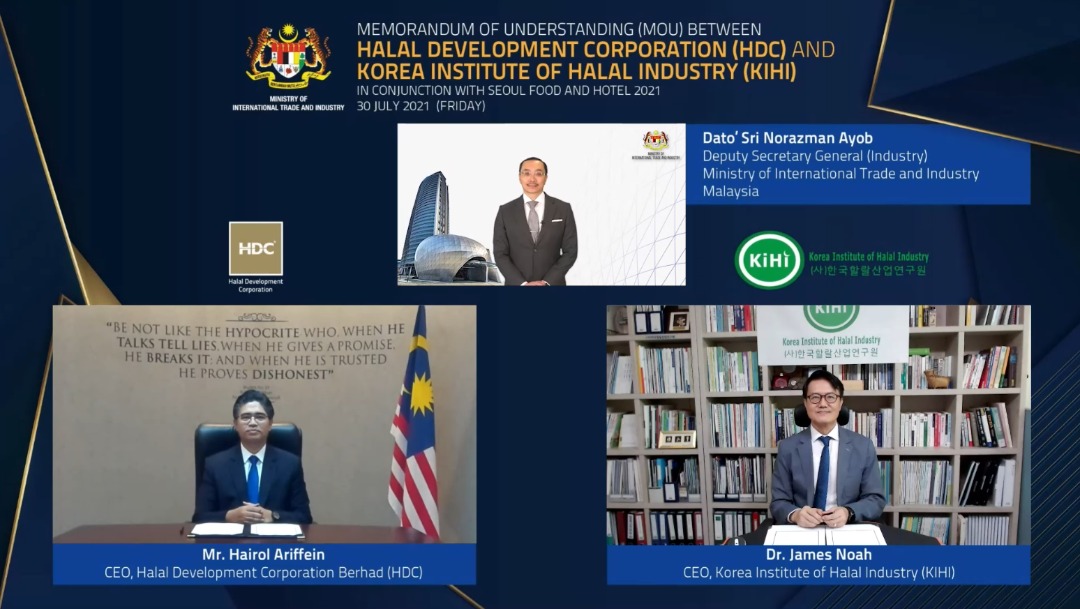The Deputy Secretary General of MITI, Dato’ Sri Norazman Ayob witnessed the signing of MOU by Hairol Ariffein Sahari, Chief Executive Officer of HDC and Dr. James Noah, Chief Executive Officer of KIHI.
Petaling Jaya, 30 July 2021 – Halal Development Corporation Berhad (HDC), an agency under the Ministry of International Trade and Industry (MITI), today signs a Memorandum of Understanding (MoU) with the Korea Institute of Halal Industry (KIHI) to promote Halal production and enhance the Muslim-Friendly Hospitality Services (MFHS) towards strengthening Malaysia’s position as the centre of Halal ecosystem development.
The signing of the Memorandum comes at an important juncture for Malaysia’s halal ecosystem by emphasising the private sector’s role in driving the nations’ economic growth. The collaboration with KIHI, an organisation established with the endorsement of the Ministry of Agriculture, Food and Rural for the development of the Korean Halal industry, represents a strategic partnership and initiative. This strategic initiative brings together both local and foreign entities to ensure all parties can benefit from business intelligence sharing, industry best practices and market expansion for both Malaysia and the Republic of Korea (ROK).
The MoU was signed by Hairol Ariffein Sahari, Chief Executive Officer of HDC and Dr. James Noah, Chief Executive Officer of KIHI, witnessed by the Deputy Secretary General of MITI, Dato’ Sri Norazman Ayob in conjunction with HDC’s virtual participation in the Seoul Food & Hotel 2021 and aired online during its World Halal Business Conference 2021 Webinar series.
“There has been strong demand for Halal products and MFHS due to influx of Muslim visitors into Non-Muslim countries such as Japan, China and ROK. Back in 2019, Muslim tourists into ROK had exceeded 1 million, which led to strong efforts by the Korea Tourism Organization”
(KTO) in adopting Malaysia’s standard for MFHS infrastructure in ROK. In view of this, I am pleased to note that HDC and KIHI have started the commitment in instilling awareness to encourage more Korean industry players to be certified with Halal for manufacturers and with MFHS for those involved in services activities within the value chain,” said Norazman.
Norazman also said, “We hope that this very strategic collaboration will open up business opportunities among our industry players with more than 170 targeted Korean companies within this two years’ time, from manufacturers to eateries and spas, and make Malaysia as the reference for the MFHS training and consultancy.”
Subsequently, this collaboration will anticipate producing a minimum of 100 Halal Industry Knowledge Workers and exporting our home-grown talent to add value to the growing industry in Korea, a country with vision to establish Seoul as a Muslim friendly city. Aside from that, 120 Korean companies will be privileged to be certified with MFHS in their business management, which serve as future business partners to Malaysian companies. This is in line with the Malaysian Government’s aspirations to create quality employment opportunities and accelerate Halal industry internationalisation in specific value added sectors.
This collaboration foresees the broader scope of economic cooperation between the Halal ecosystem communities in both Malaysia and ROK and at the same time, provides opportunities in new and innovative business areas. This collaboration is not only subject to MFHS training and consultancy. Still, it will include projects to enhance trade, exchange of market intelligence know-how, investment in Halal parks, co-organising Halal related events and various other strategic areas.
The collaboration between HDC and KIHI will also enable technology transfer and commercialisation of related research and development (R&D) products where ROK is one of the countries with a world-class network of research institutions. In addition, this collaboration will benefit both countries with the existing proficiency individual in ROK that has successfully implemented an advanced traceable system in the supply chain of its food and non-food products.
Source : HalalFocus


